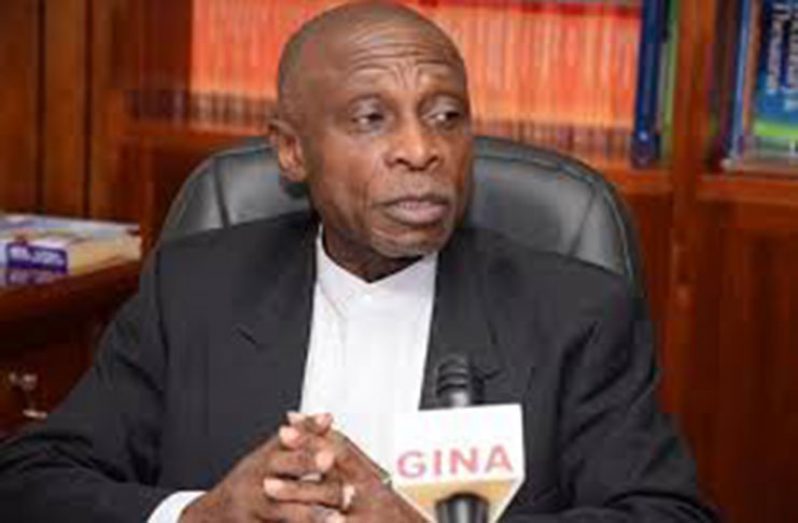By Zena Henry
THE spotlight was placed on the European market when the country’s heads of foreign missions convened their annual conference at the Pegasus Hotel last week.
Foreign Affairs Minister Carl Greenidge said economic issues drew the bulk of attention during the discussions.
“We discussed the issues associated with expanding and taking advantage of the European market for example,” he said, pointing out that Guyana is a signatory to an Economic Partnership Agreement with the European Union (EU), for opportunities to access its market.
Discussions also surrounded this framework agreement as to what could be done to stimulate the private sector and moving away from traditional trade, especially in more competitive markets.
The challenge of operating within the rules of the World Trade Organisation (WTO) was also discussed, now that Guyana is being recognised as a middle- income economy, and no longer enjoys the same benefits as lesser developed countries.
Guyana’s Ambassador to the United Nations (UN), Dr. J. R. Deep Ford said Guyana will be chairing the African, Caribbean and Pacific Group of States (ACP) into the WTO Ministerial conference in Buenos Aires in December.
“We feel there is a great opportunity this year building up to the ministerial conference,” he said, noting that Guyana has been actively involved in the process.
Guyana shares common interests in the grouping in areas of special and preferential treatment, fisheries subsidies, commerce and services.
David Hales, Guyana’s ambassador to Brussels, said with respect to Europe, the Economic Partnership Agreement signed between Guyana, other ACP nations and Europe, the Cotonou Agreement, the ACP’s position and Brexit will be discussed.
He said the Cotonou Agreement expires in 2020 and the immediate matter is preparing for the successful negotiation of a new agreement.
“Between the EU and ourselves, we have to exchange memorandums around August of 2018 and then we go to negotiations,” Hales said.
The ACP has taken the position that “we would like to see a new, all-encompassing, legally binding agreement,” he said, while noting that the EU has signalled some confirmation of such an agreement.
The ACP has also taken the position that the new agreement must cover all issues, providing for concessional financing under European financing for all ACP countries, “without exception”, to deal with the trend of Caribbean nations being designated middle-income economies and losing foreign aid.
The ACP’s position on this trend is that, “that should not be the case, we should continue to benefit from grant financing,” Hales said.
The Heads of Mission Conference also looked at the consequences of the United Kingdom exiting the EU and arrangements that might help to minimise any disruptions in trade, as Britain detaches from the European bloc.
Preferential trade and the likes with the UK for middle-income countries are on the table. However, this reality would require the UK, EU and ACP countries to seek an agreement with other members of the WTO, since any such arrangement would detour from equal trade under the WTO guidelines.
LOWERING OF TEMPERS NEEDED
Guyana’s Permanent Representative to the Organisation of American States (OAS), Dr Riyad Insanally, is hopeful that Guyana and its Caribbean Community colleagues would be of help in easing tension between OAS states over the activation of the Charter against Venezuela.
Dr Insanally believes that tempers must first be lowered and member states should restructure their approaches on the matter.
It was said that some member states, including four CARICOM countries,have requested a meeting to discuss the “dire” situation in Venezuela.
Reasons for the meeting concerned a looming humanitarian crisis arising from a shortage of food and medicines in Venezuela; a stand-off between the government and opposition parties that is destabilising the country; a rapidly deteriorating economy; and the imprisonment of opposition political activists.
The recent declaration by the Venezuela High Court to take over duties of that country’s opposition, also sparked an emergency meeting which was cancelled, since the Venezuelan court almost immediately rescinded its order.
Despite this announcement, a group of members, Dr Insanally related, pressed for the meeting although the chairman and vice chair from Bolivia and Haiti respectively, did not see the need for it to take place.
It was noted that the Honduran Ambassador proceeded to chair the meeting, outside of what is normal for the organisation.
Venezuela and other member states have come out against this act. Dr Insanally said the situation is however worrying, since the whole idea of the OAS “is to resolve problems like this through dialogue.”
He said in the matter involving Venezuela, if members cannot sit at the table, then it is difficult to formulate and execute solutions.
Guyana and other CARICOM states have mounted an approached on the principles of respect for sovereignty, non-interference, respect for human rights and the democratic order.
CARICOM does not consider expulsion of Venezuela from the OAS an option or a desired outcome.
“Almost all [CARICOM] member states had themselves stated that the expulsion [of Venezuela] is not an option,” Ambassador Insanally said.
Foreign Affairs Minister Carl Greenidge has made clear Guyana’s official position on the OAS- Venezuela matter.
“As a member of the OAS, one has to accept… where a matter affecting the fundamental principles that the OAS Charter contains, is a legitimate matter for discussions at the OAS. We are in support of the need; appropriateness for important matters and sensitive matters to be discussed by the OAS within itself and for countries to be in a position to give their views on these matters.”



.jpg)









